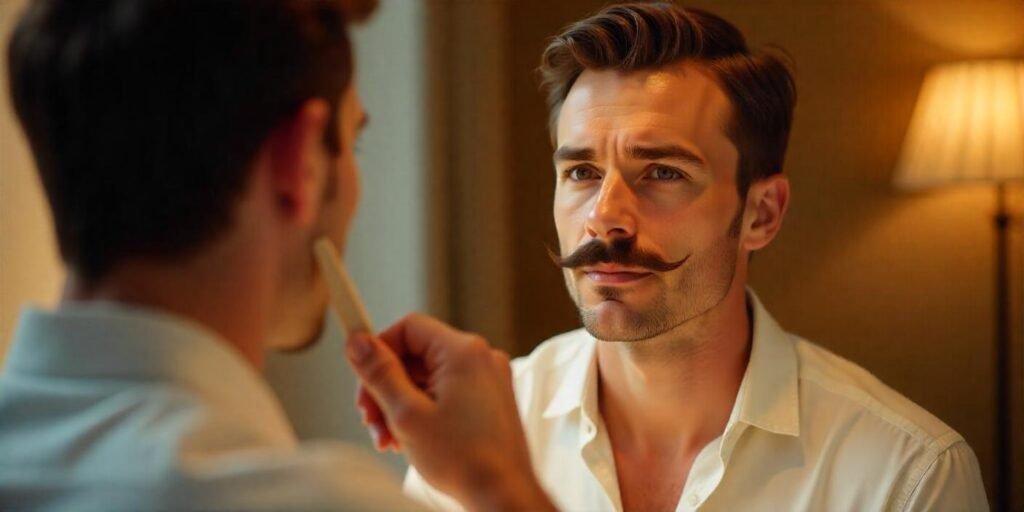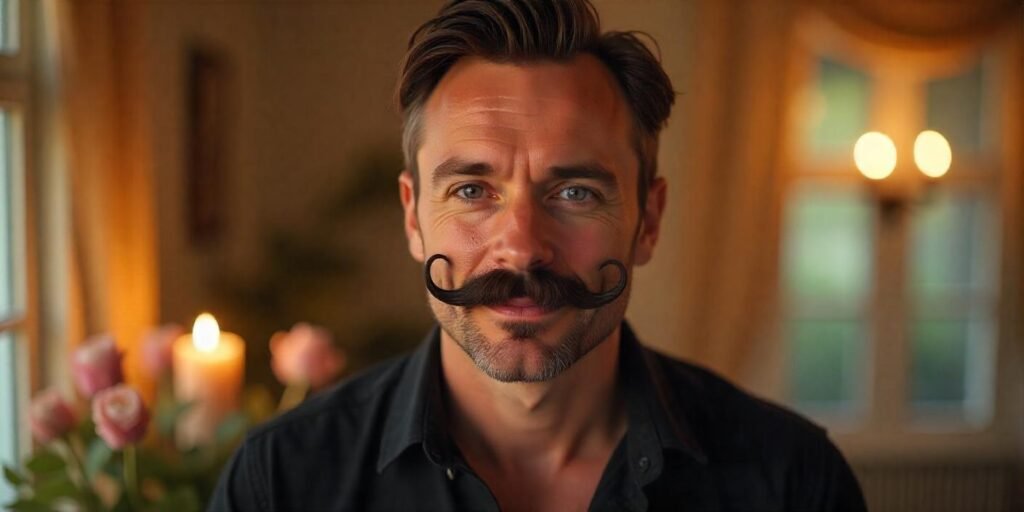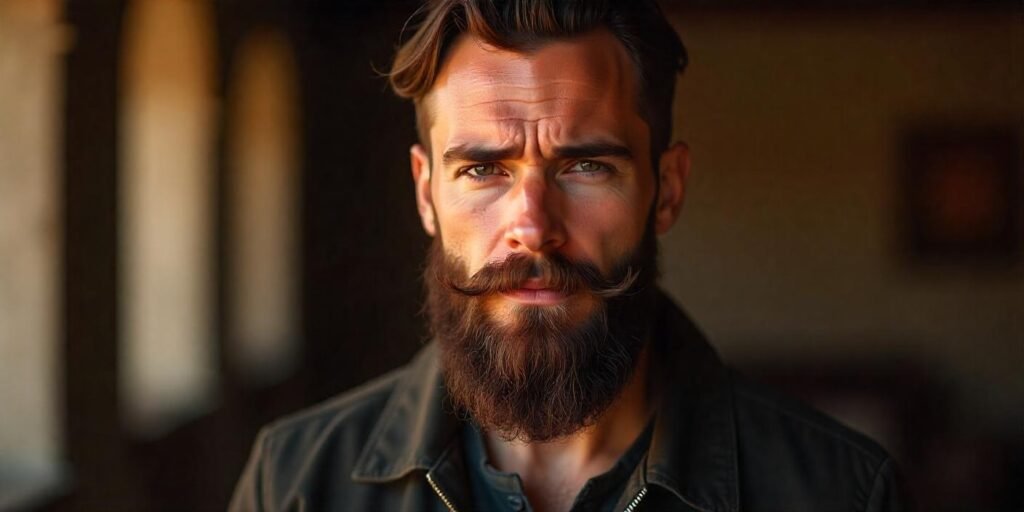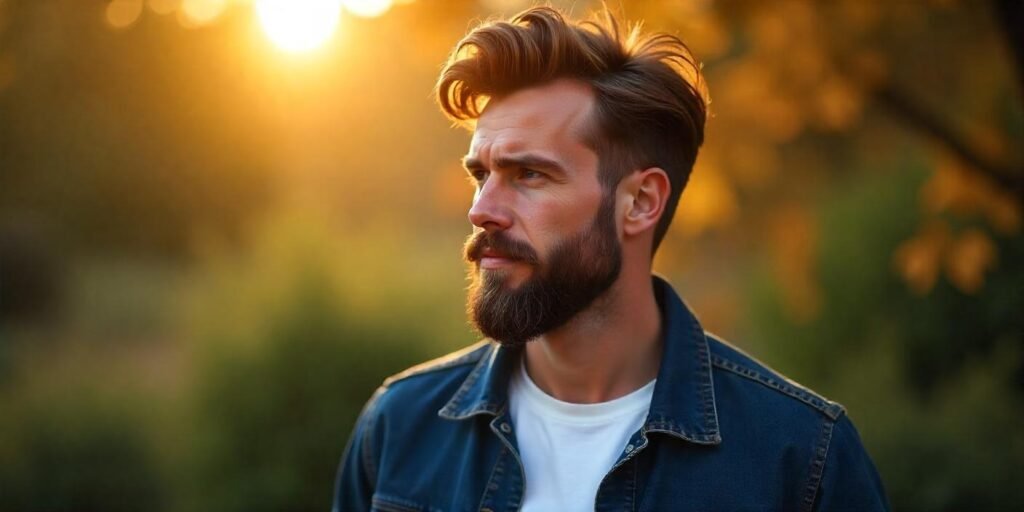Facial hair, once a symbol of power and wisdom, has evolved over time. Today, there’s a resurgence of interest in beards and mustaches, with many men choosing fuller, well-groomed facial hair.
This style has become a statement, not just for a professional look but as a form of self-expression, with options to suit anyone from all walks of life.
Whether you’re looking for classic or modern styles, facial hair offers a versatile way to showcase personality.
What is a Mustache

Grows on the upper lip and can vary in shapes and sizes, extending beyond the corners of the mouth or staying narrower. Its style depends on personal choice, facial features, and lip shape.
Grooming requires careful trimming to maintain a neat and distinct look, whether it’s full or patchy. It’s a form of self-expression and personal grooming.
The Classic Mustache:

A simple, neat style that follows the natural contour of the upper lip, staying within the mouth corners. It’s easy to maintain with a precision trimmer and a fine comb. Regular trimming keeps the shape tight and cheeks smooth, preventing overgrowth. Keep it fresh with weekly care, like famous figures did throughout their careers.
The Chevron Mustache:

Chevron is a thick, full style that covers the upper lip and extends past the corners of the mouth, like the one worn by Burt Reynolds. To get this look, let it grow thick, use a trimmer for an even length, and trim every two weeks to maintain fullness and clean lines. For extra control, you can use wax, but always keep the surrounding areas clean-shaven.
The Pencil Mustache:

This thin, narrow style follows the upper lip’s shape, giving a refined and groomed look. Clark Gable made it iconic. To maintain it, use fine combs, precision scissors, and a razor for trimming, ensuring symmetry. Regular trimming (daily or weekly) is necessary to preserve the line.
The Horseshoe Mustache:

This style features extending down the sides of the mouth, often connecting to a beard. The look resembles an upside-down U or horseshoe. Achieving it involves growing long facial hair and shaping it with regular trims to maintain the shape. Tools like a trimmer, scissors, and mustache wax (optional) are essential, and bi-weekly trims help keep the shape neat with clean-shaven areas.
The Handlebar Mustache:

Bold style features long, curved ends styled upward and away from the face, resembling bicycle handlebars. For a neater look, you can straighten the ends for an English style or go for the more extreme, artist-inspired Dali look. Wax is key to keeping the ends curled and in shape, while regular maintenance ensures the center stays neat and defined. Use a comb and wax for proper upkeep, with daily waxing and a weekly trim to keep it sharp.
The Walrus Mustache:

A thick and bushy style that covers the upper lip and extends over the mouth, similar to the facial hair of walruses, is a timeless look seen in figures like Sam Elliott and Albert Einstein. To achieve this, let it grow naturally, cutting minimally to maintain a fuller style. Use a comb for styling and a minimal trimmer for upkeep, with a monthly trim to manage stray hairs.
The Painter’s Brush Mustache:

Features a straight, horizontal shape just above the upper lip, resembling a flat paintbrush. Brad Pitt kept it after filming Inglourious Basterds in 2009. To maintain this look, grow the mustache to a uniform length and trim it to a straight line, keeping the sides clean. Regular trims every two weeks with a trimmer, scissors, and comb help maintain the shape and neatness.
The Toothbrush Mustache:

Small, rectangular-shaped style sits centered on the upper lip, just below the nose. Often linked to Charlie Chaplin, it requires frequent trimming for symmetry and proper size. Use a razor, scissors, and a trimmer for regular to maintain the shape, ensuring it doesn’t extend beyond the nose. A weekly touch-up is enough to keep it neat and clean.
What is a Beard?

Facial hair grows on the chin, jaw, cheeks, and neck. Unlike hair on the upper lip, it covers a larger part of the face. The looks range from short stubble to longer, flowing facial hair, and many see it as a special and diverse feature of personal expression.
Here’s a list of different types of beards:
Goatee:

Focuses on growing hair on the chin and lower lip in a round or square shape, with the area above the upper lip kept clean. Some people add a soul patch below the lip for extra flair. It’s a great starting point for beard growth, simple to maintain with a bi-weekly trim and a cheek shave. A scissors and razor help maintain the shape.
French Fork Beard:

To achieve the forked style, grow a full beard and use a tool to define the split at the bottom. This look, inspired by Vikings, requires regular maintenance to maintain symmetry and a clean look. Use a comb for neatness and wax to keep it in place.
Ducktail Beard:

For a bold look, this style involves a beard that is fuller at the chin and tapers towards the bottom. Achieving this requires regular trimming, keeping the shape in place. A bi-weekly trim is essential for maintenance, while beard oil helps keep the hair healthy and shiny.
Garibaldi Beard:

Go for a wide, rounded beard with a longer and unkempt style. Minimal care once a month helps manage stray hairs. Use beard oil for smoothness and grooming.
Verdi Beard:

Keep your beard full and rounded with regular grooming. A well-groomed style requires a distinct look, maintained with a trimmer, mustache wax, and a comb. Trim your beard and your mustache weekly for a fresh look.
Corporate Beard:

Clean lines are key for a beard that stays well-groomed and avoids an unkempt appearance. Use a guard and a fine comb for precise styling to maintain length and edges.
Full Beard:

Covers the cheeks and can be either short or long. Styles like the Bandholz Beard offer a more unkempt, while a Yeard grows for a year, resulting in length. The key is maintaining, whether neat or natural.
Chin Strap Beard:

It features a thin strip of facial hair along the chin, resembling a strap. Keep the area above the upper lip clean-shaven, ensuring a consistent width and clean lines.
Brett Beard:

The style features shorter sides and a longer form, with an option to add a squared soul patch for a trendier look. Regular maintenance helps maintain the length contrast, while caring for the skin beneath ensures healthy follicles.
Styles That Are In-Between
You can experiment with facial hair that combines a beard and a full beard, creating a unique look. By adjusting lengths and blending, you can tailor a style that suits your personal taste. These hybrid options allow for a creative and customizable result.
Here’s a list of some in-between facial hair styles:
Goatee and Mustache, or a Circle Beard:

A mustache and chin beard may or may not be connected. The Door Knocker Beard is a variation with a slightly longer goatee. Grow a mustache and chin beard while keeping the cheeks clean-shaven. Shape the goatee into a rounded or oval outline. Maintain an even length (e.g., 1/4 inch) for a seamless look, and use beard oil to keep it neat and soft.
Van Dyke:

Paired with a mustache, where the goatee is pointy and not connected, creates a distinctive look. To achieve it, grow a handlebar or classic version, and shave the sides clean. Form the beard into a point or slight fork for the desired effect, and use wax to define the ends. Regular care ensures no overlap between the two.
Extended Goatee:

To achieve a clean appearance, extend your beard about 1-2 inches along the jaw, and keep the cheeks shaved. Shape the chin portion to your liking—either round or square. Use a comb daily to avoid tangles, and maintain the look with a trim for clean definition.
Anchor Beard or Musketeer Beard:

It is shaped to resemble an anchor’s fluke, with the chin kept full. Using a razor ensures crisp edges and balance for a distinct, pointed appearance extending upward.
Beardstache:

This style pairs a thicker upper lip hair with a shorter facial hair setup, where the upper lip hair stands out as more prominent than the rest. It’s a balanced, subtle look that highlights the upper lip while keeping the overall style clean but not overwhelming.
Beardstache Styling Tip:
For a thicker and longer style, extend past the mouth corners, while keeping the length even. Use a low guard to maintain a short stubble. Finish with wax for definition and oil to keep it soft.
Disconnected Beards:
Facial hair sections like the soul patch are separated with noticeable divisions between them. This bold, structured design offers a more dramatic, defined look, ideal for those wanting clean lines.
Some examples are:
Chin Curtain:

The style covers without sideburns and can be worn with or without a mustache. It often features a disconnection with a thin sideburn, offering a classic look.
Chin Curtain Styling Tip:
For a clean finish, grow hair along the chin, keeping the area shaved. Use a trimmer to maintain an even length, like 1/2 inch, and shape it into a smooth curtain. Taper the ends near the ears and keep the upper lip bare.
Hollywoodian Beard:

While keeping the sideburns and cheeks clean-shaven, this offers a bold look with minimal upkeep, seen famously on Christian Bale.
Hollywoodian Beard Styling Tip:
To achieve a sleek style, grow facial hair that covers your jaw, while shaving the mustache area. Keep the edges clean and tapered towards the ears for a neat finish. Apply oil for a healthy shine.
Balbo Beard:

The soul patch creates a refined and sculpted look. It doesn’t connect to the rest, and the soul patch adds an elegant touch. It’s perfect for those wanting a clean, defined style that remains masculine.
Balbo Beard Styling Tip:
To achieve a clean style, shave the sides and leave a soul patch under the lower lip. Keep it at a moderate width, like a painter’s brush style, and form it into either a rounded or pointed form, ensuring it stays separate. Use for precise disconnection and clean edges.
The Three-Day Stubble with Mustache, or 5 ‘o’ Clock Shadow:
A short, stubbly beard offers a casual and rugged look. It mimics a few days of facial hair growth and is easy to maintain, making it a popular choice for a simple, low-effort style.
Three-Day Stubble with Mustache, or 5 O’Clock Shadow Styling Tip:
To achieve a rugged yet tidy style, let your hair grow for 3-5 days (about 1/8 inch) and evenly with a low-guard. Let the hair grow slightly longer, choosing styles like classic or chevron, and use a comb to align it. Keep the neckline clean to maintain a neat style that contrasts with the stubble.
Mutton Chops:

These are sideburns that extend down, connecting to a mustache, leaving the clean-shaven. The look can be made more approachable with the addition of a mustache, creating a friendlier vibe while maintaining the classic design.
Mutton Chops Styling Tip:
To style, grow your sideburns wide and long, stopping at the mouth’s edge or extending down. Keep the areas at a uniform thickness (around 1 inch) and remove the excess. Shape based on your face, either straight or another preferred style, and use beard oil to keep them full and healthy.
Maintenance and grooming:
Regular care is essential for keeping facial hair its best. Conditioning and using the right products like oils and balms help maintain health. Consistent effort at home and visits will ensure your facial hair stays great.
“With great beards come a great responsibility.”
Choosing to grow facial hair means embracing a style that reflects your identity and personality. Maintaining a well-groomed look requires commitment and regular care, as a fresh trim can enhance your look, while neglecting it can undermine your style. Aligning your facial hair with your personal image and fashion sense is key to feeling confident.
People also ask
What type of mustache is most attractive?
Stubble is often considered the most attractive facial hair, with a bit of light stubble being preferred by many for both short-term and long-term relationships. While less popular, full styles are seen as more masculine and socially mature. Many people find stubble the ideal balance, offering a stylish yet mature look.
What is a mustache and beard combo called?
A beardstache features a fuller upper lip style with a shorter lower face style, making the upper lip more prominent. This style offers a unique balance between the two while keeping care manageable.
What is a cowboy mustache?
Is a symbol of rugged independence, with its thick, robust extending beyond the upper lip. It reflects the fearless, hardworking spirit of men from the open plains, embodying a timeless connection to frontier history.
Which mustache suits me?
When selecting a mustache, consider how it complements your face shape. A small style can balance a narrow jaw. Avoid thin pencil styles as they can make a triangle-shaped face appear disproportionate.
Which beard style looks younger?
For a youthful appearance, keep your mustache and chin hair longer. To make it more casual, match the length of the mustache with the chin strip, creating a goatee look. The Van Dyke can be styled as stubble, rugged, messy, long, or short, or even paired with a jawline beard.
What does a mustache say about a man?
A mustache reflects a person’s character and style, ranging from confidence and masculinity to rebellion and individuality. Its look, whether classic or unique, shows the attention given to maintenance and overall presentation. How it’s worn influences perceptions, making it an expression of personality and mood.

